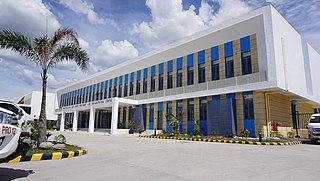Related Research Articles

Psychotherapy is the use of psychological methods, particularly when based on regular personal interaction, to help a person change behavior, increase happiness, and overcome problems. Psychotherapy aims to improve an individual's well-being and mental health, to resolve or mitigate troublesome behaviors, beliefs, compulsions, thoughts, or emotions, and to improve relationships and social skills. Numerous types of psychotherapy have been designed either for individual adults, families, or children and adolescents. Certain types of psychotherapy are considered evidence-based for treating some diagnosed mental disorders; other types have been criticized as pseudoscience.

Occupational therapy (OT) is a healthcare profession. It involves the use of assessment and intervention to develop, recover, or maintain the meaningful activities, or occupations, of individuals, groups, or communities. The field of OT consists of health care practitioners trained and educated to improve mental and physical performance. Occupational therapists specialize in teaching, educating, and supporting participation in any activity that occupies an individual's time. It is an independent health profession sometimes categorized as an allied health profession and consists of occupational therapists (OTs) and occupational therapy assistants (OTAs). While OTs and OTAs have different roles, they both work with people who want to improve their mental and or physical health, disabilities, injuries, or impairments.
Sex therapy is a strategy for the improvement of sexual function and treatment of sexual dysfunction. This includes sexual dysfunctions such as premature ejaculation or delayed ejaculation, erectile dysfunction, lack of sexual interest or arousal, and painful sex, as well as dealing with problems imposed by atypical sexual interests (paraphilias), gender dysphoria and being transgender, highly overactive libido or hypersexuality, a lack of sexual confidence, recovering from sexual abuse such as rape or sexual assault, and sexual issues related to aging, illness, or disability.

Applied behavior analysis (ABA), also called behavioral engineering, is a psychological intervention that applies empirical approaches based upon the principles of respondent and operant conditioning to change behavior of social significance. It is the applied form of behavior analysis; the other two forms are radical behaviorism and the experimental analysis of behavior.
Motivational interviewing (MI) is a counseling approach developed in part by clinical psychologists William R. Miller and Stephen Rollnick. It is a directive, client-centered counseling style for eliciting behavior change by helping clients to explore and resolve ambivalence. Compared with non-directive counseling, it is more focused and goal-directed, and departs from traditional Rogerian client-centered therapy through this use of direction, in which therapists attempt to influence clients to consider making changes, rather than engaging in non-directive therapeutic exploration. The examination and resolution of ambivalence is a central purpose, and the counselor is intentionally directive in pursuing this goal. MI is most centrally defined not by technique but by its spirit as a facilitative style for interpersonal relationship.
Self-disclosure is a process of communication by which one person reveals information about themselves to another. The information can be descriptive or evaluative, and can include thoughts, feelings, aspirations, goals, failures, successes, fears, and dreams, as well as one's likes, dislikes, and favorites.

A token economy is a system of contingency management based on the systematic reinforcement of target behavior. The reinforcers are symbols or tokens that can be exchanged for other reinforcers. A token economy is based on the principles of operant conditioning and behavioral economics and can be situated within applied behavior analysis. In applied settings token economies are used with children and adults; however, they have been successfully modeled with pigeons in lab settings.

Animal-assisted therapy (AAT) is an alternative or complementary type of therapy that includes the use of animals in a treatment. The goal of this animal-assisted intervention is to improve a patient's social, emotional, or cognitive functioning. Studies have documented some positive effects of the therapy on subjective self-rating scales and on objective physiological measures such as blood pressure and hormone levels.
Psychological resistance, also known as psychological resistance to change, is the phenomenon often encountered in clinical practice in which patients either directly or indirectly exhibit paradoxical opposing behaviors in presumably a clinically initiated push and pull of a change process. In other words, the concept of psychological resistance is that patients are likely to resist physician suggestions to change behavior or accept certain treatments regardless of whether that change will improve their condition. It impedes the development of authentic, reciprocally nurturing experiences in a clinical setting. It is established that the common source of resistances and defenses is shame. This and similar negative attitudes may be the result of social stigmatization of a particular condition, such as psychological insulin resistance towards treatment of diabetes.

A residential treatment center (RTC), sometimes called a rehab, is a live-in health care facility providing therapy for substance use disorders, mental illness, or other behavioral problems. Residential treatment may be considered the "last-ditch" approach to treating abnormal psychology or psychopathology.
The professional practice of behavior analysis is a domain of behavior analysis, the others being radical behaviorism, experimental analysis of behavior and applied behavior analysis. The practice of behavior analysis is the delivery of interventions to consumers that are guided by the principles of radical behaviorism and the research of both experimental and applied behavior analysis. Professional practice seeks to change specific behavior through the implementation of these principles. In many states, practicing behavior analysts hold a license, certificate, or registration. In other states, there are no laws governing their practice and, as such, the practice may be prohibited as falling under the practice definition of other mental health professionals. This is rapidly changing as behavior analysts are becoming more and more common.
Gay affirmative psychotherapy is a form of psychotherapy for non-heterosexual people, specifically gay and lesbian clients, which focuses on client comfort in working towards authenticity and self-acceptance regarding sexual orientation, and does not attempt to "change" them to heterosexual, or to "eliminate or diminish" same-sex "desires and behaviors". The American Psychological Association (APA) offers guidelines and materials for gay affirmative psychotherapy. Affirmative psychotherapy affirms that homosexuality or bisexuality is not a mental disorder, in accordance with global scientific consensus. In fact, embracing and affirming gay identity can be a key component to recovery from other mental illnesses or substance abuse. Clients whose religious beliefs are interpreted as teaching against homosexual behavior may require some other method of integration of their possibly conflicting religious and sexual selves.

The Association for Behavioral and Cognitive Therapies (ABCT) was founded in 1966. Its headquarters are in New York City and its membership includes researchers, psychologists, psychiatrists, physicians, social workers, marriage and family therapists, nurses, and other mental-health practitioners and students. These members support, use, and/or disseminate behavioral and cognitive approaches. Notable past presidents of the association include Joseph Wolpe, Steven C. Hayes, Michelle Craske, Jonathan Abramowitz, Marsha M. Linehan, Linda C. Sobell, Kelly D. Brownell, Gerald Davison, and Alan E. Kazdin.

Joe Kort is an American psychotherapist, clinical social worker, board-certified clinical sexologist, author, lecturer and facilitator of therapeutic workshops. He works as Clinical Director and founder of The Center for Relationship and Sexual Health in Royal Oak, Michigan. Kort also was appointed co-director of Modern Sex Therapy Institutes providing Sex Therapy Certifications and a Ph.D. in Clinical Sexology.

Psychology encompasses a vast domain, and includes many different approaches to the study of mental processes and behavior. Below are the major areas of inquiry that taken together constitute psychology. A comprehensive list of the sub-fields and areas within psychology can be found at the list of psychology topics and list of psychology disciplines.
PTSD or post-traumatic stress disorder, is a psychiatric disorder characterised by intrusive thoughts and memories, dreams or flashbacks of the event; avoidance of people, places and activities that remind the individual of the event; ongoing negative beliefs about oneself or the world, mood changes and persistent feelings of anger, guilt or fear; alterations in arousal such as increased irritability, angry outbursts, being hypervigilant, or having difficulty with concentration and sleep.
Certified Sex Therapists (CST) have graduate degrees in a clinical mental health field and have obtained advanced training in sex therapy from a credentialed training body, resulting in certification. One of the largest such bodies is the American Association of Sexuality Educators, Counselors and Therapists (AASECT).
LGBT psychology is a field of psychology of surrounding the lives of LGBT individuals, in the particular the diverse range of psychological perspectives and experiences of these individuals. It covers different aspects such as identity development including the coming out process, parenting and family practices and support for LGBT individuals, as well as issues of prejudice and discrimination involving the LGBT community.
References
- ↑ Power, Paul W. (January 1, 2007). The Psychological And Social Impact Of Illness and Disability. New York City: Springer Publishing Company. ISBN 9780826103093 . Retrieved December 15, 2013.
- 1 2 3 4 Davis, Sally (2006). Rehabilitation: The Use of Theories and Models in Practice. Amsterdam: Elsevier Health Sciences. ISBN 9780443100246 . Retrieved December 16, 2013.
- 1 2 Blonna, Richard; Watter, Daniel (2005). Health Counseling: A Microskills Approach. Burlington, Massachusetts: Jones & Bartlett Learning. ISBN 9780763747619 . Retrieved December 17, 2013.
- ↑ Comprehensive Management of Chronic Obstructive Pulmonary Disease. Shelton, Connecticut: PMPH-USA. 2002. pp. 278–279. ISBN 9781550091748 . Retrieved April 1, 2014.
- ↑ Fagan, Peter J. (2004). Sexual Disorders: Perspectives on Diagnosis and Treatment. Baltimore: Johns Hopkins University Press. p. 34. ISBN 9780801875267 . Retrieved April 1, 2014.